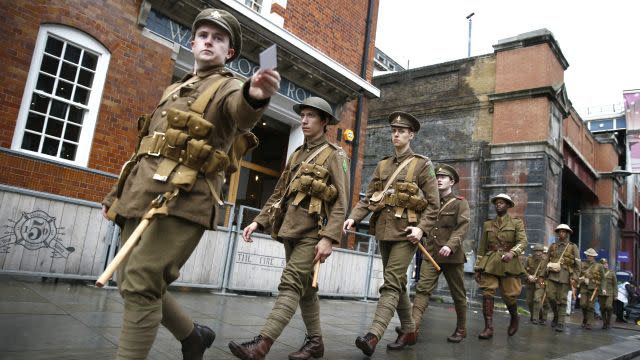Brits were moved to tears by the presence of “World War I soldiers” in their train stations all morning

For the past few weeks, the British public has been focused on its uncertain future outside the European Union. But today, thoughts turned to the past. The country paused to remember the bloodiest battle in British military history, the Battle of the Somme, which began 100 years ago on July 1, 1916.
#wearehere #Aberaeron #Somme100 made me cry… pic.twitter.com/Cb8eVFIUNp
— Deelouise (@deelouise5) July 1, 2016
Simply wonderful and incredibly moving memorial at Waterloo. Thank you Private Kyles. Thank you #wearehere pic.twitter.com/cbIwo9RR0U
— James Elliott (@jselliott09) July 1, 2016
The bloody World War I battle, fought by British and French soldiers against Germany along the river Somme in France, killed 19,240 soldiers on the first day alone. It lasted until Nov. 18, 1916 and left more than a million soldiers injured or dead. When it ended, British and French soldiers had advanced just six miles into Germany territory.
In memory of the deaths, actors this year dressed as soldiers and slowly walked through railway stations and city centers. They handed out cards bearing the names of those who died in the battle, and occasionally sang, ‘We’re here because we’re here.’ The melancholy one-line song, repeated to the tune of Auld Lang Syne, had been sung by soldiers trapped in the trenches.
#ww1 soldiers standing silent in Great Victoria Street station before breaking into song #wearehere @translink_ni pic.twitter.com/we82boooi5
— Alan in Belfast (@alaninbelfast) July 1, 2016
#wearehere & soldiers on the sand at St Ninian's Beach, Shetland. Blown away. #ww1centenar… https://t.co/n2x4CxpM4A pic.twitter.com/RzzptyeNhX
— Lisa Ward (@sheltielisa) July 1, 2016
Plymouth train station #wearehere pic.twitter.com/RdD4EzIuV0
— Kevin Johnson (@Kev_Johnson__) July 1, 2016
Commuters were moved to tears by the sight of the young soldiers, sharing photos with the hashtag #wearehere. There were reports of the soldiers in cities across the UK, including London, Bristol, Swansea, Newcastle, Salisbury, Manchester, Sunderland, and Aberdeen.
I'd never seen Mam cry before. 'Ghosts' at the station took her to a place we all should remember. #NewAlanBennettMonologues #wearehere
— I haven't (@witchesvictim) July 1, 2016
Soldiers at Clickimin Broch, Shetland #wearehere #somme #somme100 #ww1 #ww1centenary pic.twitter.com/4FctXQlMg0
— Lisa Ward (@sheltielisa) July 1, 2016
#wearehere at Brixton station this morning. Silent as ghosts pic.twitter.com/473L5xyYh3
— Linda Grant (@lindasgrant) July 1, 2016

Sign up for the Quartz Daily Brief, our free daily newsletter with the world’s most important and interesting news.
More stories from Quartz:

 Yahoo Finance
Yahoo Finance 